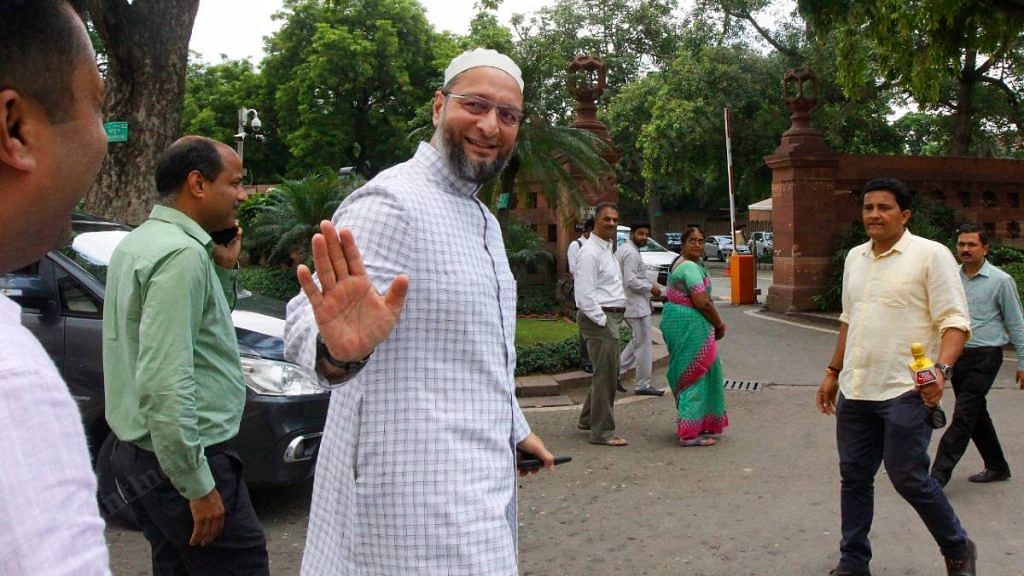New Delhi: The Asaduddin Owaisi-led All India Majlis-E-Ittehadul Muslimeen (AIMIM) bagged five seats in the Bihar assembly elections, prompting critics such as the Congress to accuse it of dividing the secular vote and behaving like the BJP’s “B-team”.
“Secular parties are now paranoid about Owaisi because they’re worried that now he’s made inroads into Maharashtra and Bihar, what if he does so in Uttar Pradesh?” says ThePrint’s Editor-in-Chief Shekhar Gupta in episode 616 of ‘Cut The Clutter’ Wednesday.
Gupta adds that while the Congress is willing to team up with the Indian Union Muslim League (IUML) in Kerala, it is shy of an arrangement with Owaisi for fears that it could be seen as anti-Hindu.
Congress should realise that it “cannot become more Hindu than the BJP” and it needs to start looking at political players like Owaisi differently to counter a force as dominant as the BJP, Gupta says.
Also read: Six takeaways from the Bihar election results
Owaisi’s growing appeal
Gupta explains that when Owaisi divided the secular vote or the Muslim vote in the past, it did not evoke such a strong negative response, adding that the political question around him has now evolved.
According to Gupta, in the 2015 Bihar assembly elections, AIMIM candidates didn’t fare well because Muslims in the state thought it best to vote for parties that were “tried and tested” — the RJD and Congress.
But then the AIMIM started to become successful in other states. In the 2019 Maharashtra assembly election, AIMIM picked up two seats, challenging the Congress and NCP grip over the Muslim vote. After Bihar, it shows that no secular party in India can take the Muslim vote for granted, Gupta adds.
Evolution of Muslim vote in Independent India
Since Partition, Muslims in India have never trusted a fellow Muslim as their leader, Gupta says.
In the 1920s, when Mahatma Gandhi was concerned that Congress was still seen as a Hindu party, he got the party involved with the Khilafat movement. This created a new Muslim leadership in India and the first impulse for the two-nation theory.
Gupta adds that for the next six decades, Muslims trusted the Congress party and members of the Nehru-Gandhi dynasty. They, however, became disillusioned by the Shah Bano case and tensions around the Ramjanmabhoomi-Babri Masjid dispute during Rajiv Gandhi’s tenure as Prime Minister. That sentiment was cemented with the demolition of the Babri Masjid in 1992.
Gupta says that Muslims then opted for other non-Muslim leaders like Mulayam Singh Yadav in Uttar Pradesh, Lalu Yadav and partly Nitish Kumar in Bihar and Mamata Banerjee in West Bengal. They still voted for the Congress in places where there weren’t strong political alternatives.
However, the Congress, which has benefited the most from the Muslim vote, hasn’t produced one Muslim leader of consequence despite the likes of Zakir Hussain Gesawat and Fakhruddin Ali Ahmed, adds Gupta.
In the 1960s, a Muslim party, the All India Muslim Majlis, did emerge in the Hindi heartland but once it joined the informal coalition against Indira Gandhi, it became “subsumed by socialist politics” and went into decline.
Owaisi is a very good example of how India’s Muslims are still not entirely keen to have a Muslim represent them, adds Gupta.
Also read: Despite the sweet victory, Modi-Shah BJP has a Nitish Kumar-sized problem in Bihar
Emergence of Muslim leaders
Like Owaisi, a new political figure in Assam, Badruddin Ajmal has emerged, Gupta says, but adding that since Muslims are concentrated in a few constituencies in Assam, especially those nearer to Bangladesh, the politics there has become polarised.
Gupta then describes the BJP and RSS’ “35-year-project” to create a narrative in Assam that Muslim immigrants from Bangladesh, who Ajmal represents, pose a threat to the indigenous Assamese causing Ajmal to be “demonised” in the state. Comparatively, Owaisi has been able to expand his footprint beyond Hyderabad and he’s also English-speaking and media savvy, observes Gupta.
To explain the dearth of Muslim leaders, Gupta recalls how senior BJP leader Balbir Punj once explained that Muslims have a “veto” on who will rule India. Take the fall of the Vajpayee government in 2004 and its inability to form a coalition government as other parties were afraid they would lose their Muslim vote. Alternatively, Congress was able to form a coalition government which was UPA-I, he says.
Gupta observes that today, the BJP has stopped reaching out to Muslims completely and there is a situation where other than the Ministry of Minority Affairs, there are no Muslims in the Union Cabinet.
To counter such a dominant force, Congress and other secular parties must reach out to the likes of Owaisi and Ajmal, make their arrangements with them and not be afraid of sharing their support base, Gupta adds.
